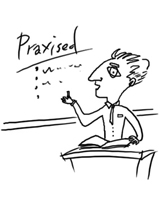From the brilliant xkcd site.

When I was in the first year of my MA-TESOL program, I got a job as an ESL adjunct at a nearby community college. It was a great experience, but I made a lot of mistakes. The ones that stick with me the most were the times I was asked a question about the English language that I didn’t know how to answer.
This was more common in grammar than in vocabulary. Native speakers (usually) have a good sense of what is grammatical and what is not, but having gained this knowledge implicitly, they are typically at a loss to explain the grammar rules. One of my first classes was teaching advanced grammar. It was only as I began to teach that I really learned terms like present and past perfect aspect, gerunds and infinitives, and so on (though to my MA program’s credit, they did offer a pedagogical grammar course that I later took). I often found myself learning a new grammar point (or at least how to articulate it) the night before I taught it.
Still, there were times when I just wasn’t prepared for a student’s question. Once, a student asked why in spelling we sometimes double the final consonant of a verb before adding -ed or -ing. I’m sure back in elementary school at least one diligent teacher tried to make me understand the exact rule, but that information had long faded from memory. As I recall, I responded by saying that we only double the final consonant for short words, like cut. That seemed to have done the trick, as there were no further questions from the students, and I moved on with the grammar lesson. But sometime soon after, perhaps even in that same lesson, I noticed an example of a two or three syllable verb that doubled the final consonant before the ed or -ing ending.
It was at this moment I realized I had made a good decision not to be a doctor.
I looked up the answer and to my chagrin, my explanation was off. I struggled with how to handle this embarrassing situation. I knew I really had to say something to my students in the following class, but at the time I was too insecure as a new teacher to openly admit my lack of knowledge. In an effort to save face, I finally decided to let the students know that my previous explanation about the spelling rule was ‘incomplete,’ and that there was more I wanted to explain. I hoped to give the impression that I knew the rules all along but just didn’t want to get off track in the previous class with a long explanation.
Every language teacher, whether a native speaker or non-native speaker, goes through these times when we are caught off guard. It can happen with vocabulary as well. Student expectations of a teacher’s knowledge can be unreasonably high in this regard, as there are over 200,000 words in the Oxford dictionary with the average native speaker knowing only 20,000-30,000 of them. Of course, a large chunk of these are no longer used by the vast majority of people, and many are so specialized that only members of specific professions or interests know them. Other words are common only in very specific regions, and so on. There are also hundreds and perhaps even thousands of words that we have encountered before and have a vague sense of what they mean but never stopped to find out the exact meaning. When it comes to vocabulary, there is lot more that we don’t know than we know.
Known unknowns, unknown unknowns…it’s complicated.
Going back to my first grammar class and my attempt at saving face, here’s my question: Did my students buy it? I suspect at least a few did not. I believe that many students can pick up on small clues that a teacher gives off when he or she is in over her head, such as a slight hesitation, a frozen smile, a hint of defensiveness in our tone, a small unconscious widening and perhaps darting of the eyes, and other tell-tale signs that our brains are going into panic mode.
The xkcd cartoon gets it right. It’s far better to admit you aren’t sure of the correct answer (but will look into it) than to bluff your way through it. In the long run, you’ll probably have more respect and trust from your students. However, at the same time, language teachers do have a duty to know the language they are teaching. For grammar, The Grammar Book is great for getting teachers up to speed on the ins and outs of most grammatical issues that come up in classes. If you can find a copy, A Comprehensive Grammar of English goes into even more depth. For vocabulary, websites like vocabulary.com and dictionary.com have resources to expand vocabulary for native and non-native speaking teachers alike. Most importantly, native English speaker or not, reading is irreplaceable for expanding vocabulary knowledge.


